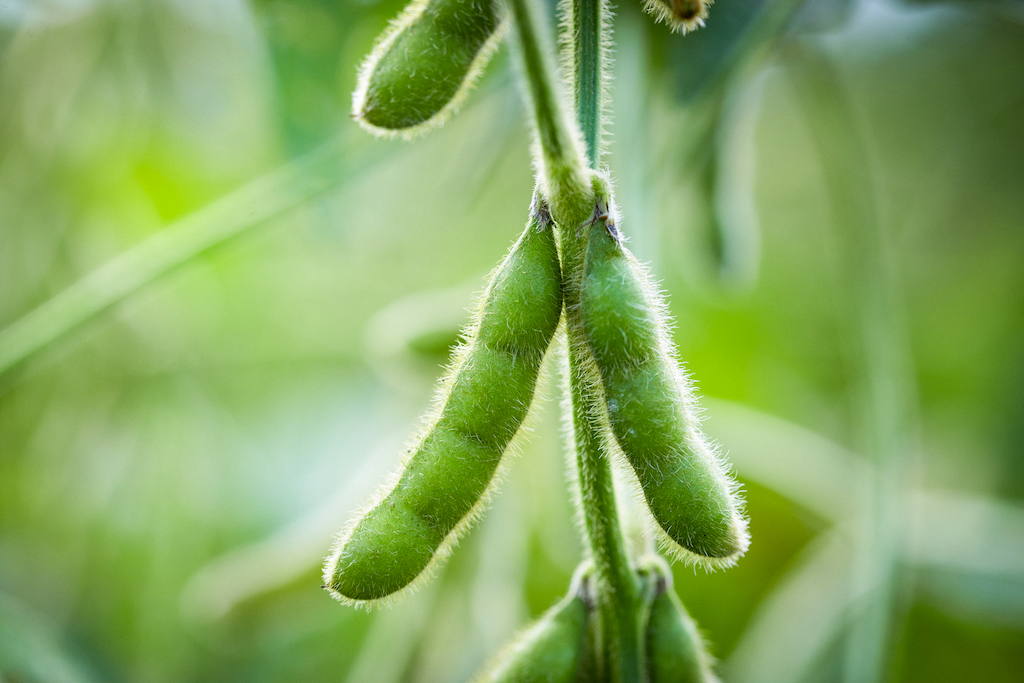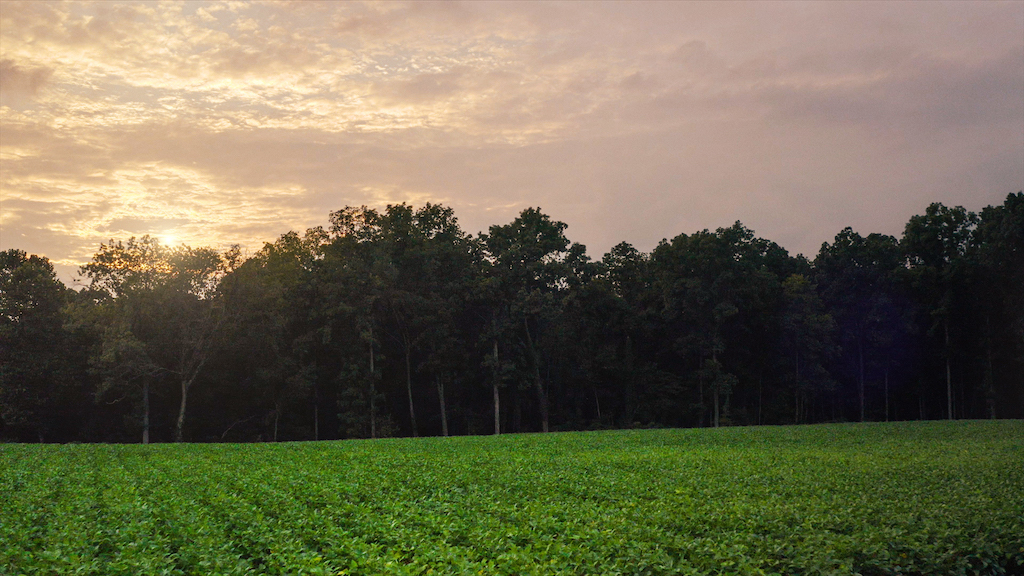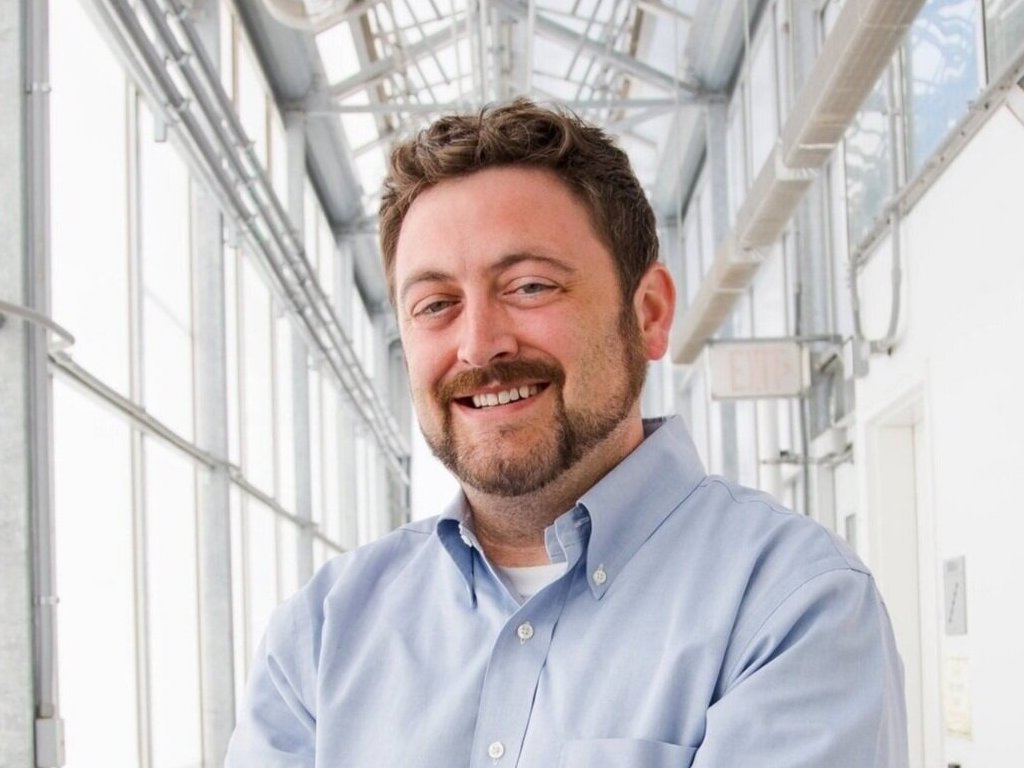Soybean Innovator Benson Hill’s CEO: ‘I Don’t Think You Can Get To Parity Level With Meat Without Ingredient Innovation’
12 Mins Read
Matt Crisp is the CEO of Benson Hill, the company using AI to create sustainable foods and ingredients. Based in St Louis, Missouri, the firm describes itself as a “crop design” company combining AI, data analytics, food science and plant biology to unlock the ingredients that can be used to make novel sustainable proteins. Recently, Benson Hill revealed its plan to go public via a SPAC deal, which is set to give the firm a billion-dollar valuation and fuel its big plans to go all-in on the plant-based meat segment.
Crisp recently sat down with Green Queen Media’s editor-in-chief Sonalie Figuerias. In this interview, the CEO shares more about why Benson Hill is bullish on plant-based, the inner workings of the company’s CropOS tech engine, sustainable agriculture, and why ingredient cost what’s holding back the alternative protein industry.
GQ: Let’s start with soybeans. It’s an extremely misunderstood crop, and often associated with GMOs and how those can impact human health. But many plant-based companies, such as Impossible Foods, argue that there’s no way to scale plant-based meat without using soy. It’s scalable, affordable and viable. What’s your thoughts on the perception of soy?
MC: Soy can get a bad rap, because it’s one of the couple crops that there’s been tens of millions of acres of adoption. Obviously, the focal point of big agriculture historically has been on yield. And to your point about GM, it took sort of a ride-along with soy and corn. When we think about the value of it as a crop, I think that observation is exactly correct, that there is no more scalable source of protein, using photosynthesis and creating in the field, from a seed as rich of and as healthy as a whole a protein as soy. And we’ve benefited too, from some of the yield gains of the crop and agronomic practices that are really well understood by growers. Then you combine it exactly with what you said about affordability. Sometimes we call soy the king of protein, right? In terms of its PDCAAS score, the measure of the healthiness of the protein, it’s nearly one. It’s one of the closest to the yellow pea. So truly from an affordability, scalability, healthiness perspective, it’s a crop we’re most excited about and it constitutes a significant majority of the growth for Benson Hill in the near term.

GQ: Benson Hill has this ultra-high protein soybean. Can you tell us more about it?
MC: In essence, what we’re doing here is we’re packing more nutrition density into the crop itself. So we use this term often: make it better from the beginning. The primary input for plant-based meat alternatives is SPC, soy protein concentrate. And the way you get this base protein ingredient, SPC, is you take a soybean which is about 20% oil and 80% other carbohydrates and protein, and you defat it by extracting the oil. You end up with this meal, and if you’re in the commodity system, you end up with something around the 46-49% protein range. That means the majority is still not protein, and it’s not very good in that this flour isn’t a good input for plant-based meat alternatives.
But what you can do through this soy protein concentrate processing step, which uses a really water and energy-intensive process, is turn that flour into a concentrate to make somewhere between 60-70% protein content. What Benson Hill is doing with our ultra-high protein is we’re saying: look, the only real purpose of this concentration stuff is to concentrate the protein. Why don’t we just load up the crop with the protein density that’s required to meet that specification, so that when you just go through that defatting stuff, and you create this flour, that flour has to be 60-70% protein content. And that’s essentially what we’ve done.
This is why we’re really able to even further decrease the cost of soy protein-based ingredients, because you’re disintermediating some very expensive and environmentally intensive processing that’s traditionally required in this commodity system.
GQ: So essentially, you’re helping the industry skip a step?
MC: Yes, entirely. It rips costs out of the equation, a tremendous amount of water, CO2 and energy. Simultaneously, we can make the grower more profitable, and create a traceable identity-preserved production system. That’s providing them incentives, essentially, to grow these proprietary crops that are intensely focused on quality, not necessarily just quantity. Then to the customer—the CPG or the food manufacturer—we can turn around to them and offer them a solution that’s much more sustainable and has the same product specifications as what they buy currently. Oh, and by the way, we can do it in a way that’s more affordable to them as well.
GQ: That’s super interesting. Some folks might still not be able to quite grasp how Benson Hill is doing something different from what GM crop companies are doing? Could you explain further?
MC: We’re really focused on using data and a lot of AI that in the last 10 years, you’ve seen rapid uptake of. We’ve leveraged a proprietary set of germplasm genetics. Essentially, we’ve merged a really rich pool of very diverse genetics and soybean, with a technology platform we call crop elastic or crop operating system, where we run genomic analyses and predictions and simulations to essentially say: how can we breed for this diversity, with this diversity? How can we breed for something that’s got a higher protein concentration, and not necessarily just a higher yield?
So the big agricultural seed companies, for decades, have focused on yield, yield, yield. And the GM traits that have come along with that are really built to try to enhance yield, or to reduce the loss of yield by getting rid of insect and weed pressure.
All of our products are actually non-GMO, they’re Butterfly Certified. So we’re leveraging the natural genetic diversity that’s there, we’re just using technology as a tool and a driver. Now, over time, we’re making bold investments in CRISPR and gene editing. That’s an area of biotechnology that we’re really excited about. In fact, we’ve got our own proprietary set of CRISPR, nucleases, that are validated plant species. But the products that we have on the market today are not gene-edited. I draw that distinction because gene editing is non-GMO, it’s still tapping only into the natural genetic diversity that’s there. But in some jurisdictions, you know, such as Europe, it is considered a GMO. In Asia, in the US and South America, it’s not.
GQ: So what you’re doing is GM in Europe, but not elsewhere?
MC: Everything we’re doing today and everything we’re on the market with today is actually non-GMO globally. But in the medium term, we are investing in gene editing. So in a few years from now, we’ll come out with products that are gene-edited, some of them in soybeans and some other crops. But that’s a few years away. I call that out because that’s biotechnology. It’s considered GMO in Europe, but non-GMO everywhere else in the world.

GQ: Let’s talk about animal feed. Around 70% of US soybeans are used for animal feed. Why can’t we just divert these soybeans for human consumption? Where do you fall on that debate?
MC: Well, I would say certainly the majority, and maybe the significant majority of acreage and soy acreage is produced for animal feed. What we have to remember, though, is I don’t actually think that we need to disrupt the system. We don’t go to a grower and say: we want you to not grow soy for animals, but to grow soy for human consumption. Instead, it goes something like this: we’ve got protein-rich, high-quality soybeans that are non-GMO, and we want to contract with you to produce this in a manner that stays separate and apart from the commodity system. We need you to plant it in a certain location and to essentially preserve its identity and the product integrity. So to your point, they were probably growing beans that would have been put into a commodity system, which probably would have gone to the feed market. Now, what we have to think, though, is that it’s not just the plant-based market that is exploding. The animal protein market globally is still growing at a really pretty significant rate. Primarily because of South America, China and India, where you’re seeing meat consumption go up.
But the thing that’s fascinating, of course, is that for every acre of soybeans, you have to produce, I don’t know, something like six or eight pounds of feed, in order to get a pound of beef. You’ve got to produce somewhere between two and three or four pounds of feed in order to produce a pound of your poultry or swine meat. So when you think about diverting the acreage that you’re describing, you don’t necessarily need to grow the acres, or take acres away. You may see a net resource reduction because I’m taking away the need to have planted two to eight acres of beans to create a pound of animal meat.
GQ: What do you say to people who feel like soy has become the monocrop poster child?
MC: What I would say is there’s a remarkable amount of genetic diversity within the crop, right? I mean, there’s a tremendous amount of biodiversity within the species. For those who, I think, very rightfully look at monoculture, I would also say that progressive farmers have been and are increasingly interested in regenerative ag practices. No tillage is an obvious one, but cover cropping is another. We’re actually working with farmers to better understand these practices and implement them.
Then for those who might say, I just can’t get comfortable with that idea. That’s where I offer that we can use these same genomics tools and innovation, to tap into the natural genetic diversity of other crops. We’ve got a really robust yellow pea breeding program. And we’ll be actually talking more publicly about that in the not too distant future too. The yellow pea is a really cool crop, it’s got some nice functional properties, obviously, and it’s become more popularised, but it’s more expensive and currently less environmentally friendly than soy. But we can tap into the natural genetic diversity of it to similarly disintermediate some of these super expensive energy and water-intensive processing steps.
GQ: Are you going into peas then?
MC: We already are. We’ve had a breeding program for years for the yellow pea, and we just haven’t talked about it very much publicly. We’ll begin to do that in the not too distant future. The pea is a cool crop. It’s really exciting. What I think that the key point I’m trying to make is that our intent is not to say: here’s the solution. The right way to position this is to create a choice for growers, a choice for consumers. You know, some consumers want non-CMO butterfly certified, fine. Some don’t mind GMO, fine. Some, I think, will embrace this CRISPR in gene editing, especially when we understand how it can make crops more climate-resilient and sustainable. So that’s an option. Yellow peas might not be an option, maybe it’s chickpeas or lentils. So I’d offer that. We are very much a proponent of not restricting innovation, and really empowering that across the system. And over time, there’ll be lots of crops that, frankly, have not gotten much attention that deserve it, and that we want to make investments in.
GQ: Let’s go back to something you said earlier about how not all soybeans are created equal. Perhaps that’s the message that isn’t necessarily getting through?
MC: Right, yeah. Think about edamame. You think about this as a soybean when you have edamame, like, that’s a food-grade genetic variant that tastes delicious. I love edamame. We’ve been eating that since we’re kids. And we have soy everywhere. We have hundreds of kinds of tofu on the market. It’s just a different relationship with the soybean, I think. We all have soy sauce in our houses, maybe like five different kinds.
GQ: Is soy the cheapest plant protein because it’s a monocrop and there’s so much soy around then? Or is it because it is genuinely botanically the most efficient?
MC: It’s really the latter. You can achieve scale with any crop, if you’ve got enough acres in the ground, it’s just pound for pound input for output. It is just the most productive. I think, botanically, its genetics are geared towards being able to produce a good deal of protein per unit input. We obviously do that domestically here, but it’s also grown in different genetic variants around the world as well.
GQ: What are the biggest countries in the world for that? There’s obviously Brazil and Canada, for example.
MC: Yeah, you’re seeing more in Canada and in Argentina as well. There are some soybean-growing regions in Europe, but they are more southernly, like Italy. And in Brazil, the principal growing regions would have the same temperate climate as Louisiana or Arkansas. The US is a little bit warmer. Sometimes you don’t realise this when you look at a map, but Italy is like North Dakota or something. It just depends. Our focus has been on the US in the Midwest, but we’ve got crops in the ground from Nebraska all the way over to Maryland, and as far south as Arkansas. These are all different maturity groups with different maturity profiles. But again, the commodity system that’s commercialising those today has really restricted the genetic diversity that we’re tapping into. And we’re really about helping unlock that.
GQ: Moving onto the plant-based eating movement and the role of soy and Benson Hill in that. Do you feel like your customers have changed? Are more plant-based companies coming to you?
MC: I’ve been surprised in the last year. You know, just since the pandemic, how many incumbents and how many well-established companies have thrown their hat into the ring here. I think a lot of really big organizations are plowing innovation dollars into this movement, and understanding that this is very certainly a significant trend. It’s not a fad. It will be a massive global movement. So I’ve been impressed by how many companies have actually stepped up to the plate. From our perspective- our role- we see ourselves playing is more picks and shovels. There’s going to be winners, at a brand level, and there’s going to be losers. I think Benson Hill’s standpoint is: if we can create more sustainable and simultaneously more affordable ingredients solutions, we could actually accelerate the growth trajectory of this market. I personally think the biggest thing holding it back is cost. I love the Impossible Burger, but I’m not gonna pay 2.5-times what it is for meat. So we’ve got to figure out a way to make this more, not just sustainable, but more affordable. I don’t think you can get to the parity level with meat if you do not use ingredient innovation.
GQ: The rise of plant-based is also very much happening in Asia, and Benson Hill closed a $150 million Series D last year with quite an international group of investors. Are there global plans you can share?
MC: Yeah. E-mart, which is part of the Shinsegae Group in South Korea, joined as a significant investor in our last round of financing. So we’re obviously very keen to learn more and to grow towards and into the Asian market. We also had Wheatsheaf, part of the Grosvenor Estate in the UK, which is like a $70 billion enterprise and they’re very sustainably oriented investors. And of course, we also had Google’s GV and Louis Dreyfus. I really loved the way the syndicate turned out, because it represented interest across the value chain and we had a lot of impact-oriented dollars coming into the company.
Lead photo: Matt Crisp courtesy of Benson Hill.





